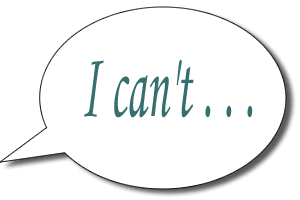 Essay: A Perspective on “I Can’t”
Essay: A Perspective on “I Can’t”
 By Chick Moorman, author of Teacher Talk
By Chick Moorman, author of Teacher Talk
Most of our “I can’ts” are lies. A gentler way of saying that is to say they are simply not true. The truth is, in most of these cases, if we wanted to badly enough, we could do whatever it is we think we can’t do. I can’ts are a way we have of talking to ourselves so that we don’t have to take responsibility for the decisions we make. They are a language technique for keeping issues away from us, out at a safe distance. They are a way of disowning responsibility and getting ourselves off the hook. After all, if I can’t, then how could I possibly be responsible?
When you say, “I can’t come over right now,” you choose language that implies no choice on your part. Your words paint a picture of yourself as a victim of circumstances, as someone who is out of control. Actually, you could come over right now if you wanted to badly enough. Perhaps you are choosing not to come over because you’re in the middle of lunch and have three activities planned for the afternoon. You could skip lunch. You could cancel your other plans. It’s not that you can’t. You really are making a deliberate choice not to come over, based on your other priorities.
When you say, “I can’t stop loving her,” you choose words that deny you are in control of your loving and absolve you of all responsibility for your attitude and actions. Certainly you can stop loving her. Loving is a choice you make. You’re not stuck loving her for the rest of your life. You can move your energy and your attention to someone else if you want to. What you really mean when you say “I can’t stop loving her” is “I don’t want to stop loving her because it’s fun to feel bad” or “I don’t want to spend the time and energy necessary to change my current situation.”
“I can’t get organized.” “I can’t lose 15 pounds.” Of course you can get organized. You’re just not choosing to right now. Certainly you can lose 15 pounds. All you have to do is design and implement a program of regular exercise and diet or use a plan devised by your doctor, depending on why you gain weight. Your not losing 15 pounds and your not being organized have nothing to do with can’t. They have to do with choices and priorities: they are the results of decisions you make about how to live your life.
 “I can’t golf,” you might say. Why would you want to believe that? Golf is a physical and mental activity requiring skills. Those skills can be practiced and learned. If you devoted hours of practice, piles of money, and loads of perseverance to the task, you, too, could become an accomplished golfer. You’re just choosing not to do what it takes at this point in your life. You have different priorities and are making other choices. It’s not that you can’t play golf well — you just haven’t done it yet. You are, by dint of how you choose to live your life, choosing not to play golf well at this time.
“I can’t golf,” you might say. Why would you want to believe that? Golf is a physical and mental activity requiring skills. Those skills can be practiced and learned. If you devoted hours of practice, piles of money, and loads of perseverance to the task, you, too, could become an accomplished golfer. You’re just choosing not to do what it takes at this point in your life. You have different priorities and are making other choices. It’s not that you can’t play golf well — you just haven’t done it yet. You are, by dint of how you choose to live your life, choosing not to play golf well at this time.
“I can’t afford a new car” may be one of your statements. Of course you can afford a new car. That might require you to change a few priorities in your life though. You could sell your house and rent one or decide not to help your children complete college. You could get a job in addition to your other work or use the equity in your house as security for a loan. You can get a new car if you really want one. Aren’t you really choosing not to?
Note: Some “I can’ts” are real, such as “I can’t grow three feet taller.” “I can’t swim across the Atlantic Ocean in two hours.” However, we have been bombarded in our culture with such a steady stream of “can’ts” that many of us have come to believe falsely in our own limits. Are you sure it’s an “I can’t” or could you do it if you wanted to do it badly enough?
“Argue for your limitations, and sure enough, they’re yours.”
Richard Bach
More Key Information
